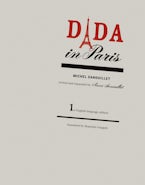An illuminating account of the ragged emergence and decline of Dada in the Parisian literary world, and the volatility of the human relationships behind the magazines 391, Dada, and Literature in particular.
Clive Phillpot, freelance writer and curator, and former art librarian
It is Sanouillet's exhaustive approach and painstaking attention to detail, coupled with the obvious pleasure he gained from his research that makes this excellent translation a must for any Dada fan who has not read it in the original language.
The Art Newspaper
Tzara famously declared that 'Dada is not modern'; Michel Sanouillet's history of its most fruitful and tumultuous years is for its part timeless. This classic study takes its place alongside Hans Richter's Dada: Art and Anti-Art and Robert Motherwell's The Dada Painters and Poets as an indispensable reference for any serious Dada-watcher. The lengthy appendix of correspondence alone is worth the price of admission but Dada in Paris offers much more than that: having sifted through mountains of unpublished and archival documents Sanouillet has crafted a detailed nuanced astute and even (appropriately) humorous account of Dada's migration to France, its guerrilla blitz against the status quo, and its formative impact on decades of intellectual life. The French edition of Dada in Paris has well withstood the test of time; its publication in English arrives not a moment too soon.
Mark Polizzotti, author of Revolution of the Mind: The Life of Andre Breton
Sanouillet's Dada in Paris is rigorous history while managing to be simultaneously voluptuous like a bath and thrilling like a tabloid. The enormous research and detailed scholarship of Dada's crucial Paris years unfolds here with a joie-de-vivre possible only by having an artist-in-residence, a feat that Sanouillet accomplishes with grace and verve. Short of having experienced 1921 in Paris at the side of Tristan Tzara, I can't think of better company than this dream-inducing thriller, document, and love fest. Like Dada itself, Sanouillet married incompatibles and created a text that resounds with the urgent concerns of the twenty-first century. Dada's timeless time beats are impossible to ignore now.
Andrei Codrescu, author of The Posthuman Dada Guide: Tzara and Lenin Play Chess












